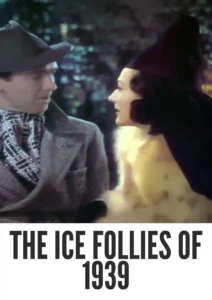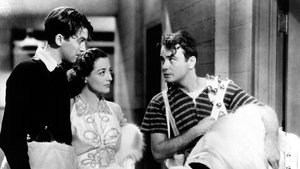Contact: info@alwanfilm.com
Video Sources 0 Views
- Watch trailer
- The Ice Follies of 1939


Synopsis
Table of Contents
ToggleReview: The Ice Follies of 1939 1939 Colorized – A Spectacular Showcase of Grace and Glamour on Ice

Introduction
“The Ice Follies of 1939” (1939) glides onto the silver screen as a dazzling display of talent and spectacle, capturing the hearts of audiences with its mesmerizing performances and captivating charm. In this review, we delve into the magic of this classic ice skating extravaganza and its enduring appeal in the world of cinema.
Check The Full Colorized Movies List
Check Our Colorized Movies Trailer Channel
Understanding The Ice Follies of 1939 1939 Colorized: Director, Cast, and Genre
Directed by Reinhold Schünzel, “The Ice Follies of 1939” (1939) showcases his flair for crafting visually stunning spectacles that transport audiences to a world of elegance and enchantment. The film features a stellar cast of ice skating legends, including Joan Crawford, James Stewart, and Lew Ayres, whose graceful performances dazzle and delight viewers of all ages. Combining elements of musical, romance, and drama, “The Ice Follies of 1939” (1939) takes audiences on a magical journey through a winter wonderland of shimmering ice and sparkling sequins.
Exploring the World of The Ice Follies of 1939 1939 Colorized: Plot and Characters
At its core, “The Ice Follies of 1939” (1939) follows the story of a talented ice skater, portrayed by Joan Crawford, who rises to fame amidst the glitz and glamour of the ice follies. Along the way, she encounters a dashing journalist, played by James Stewart, whose passion for the sport and unwavering support ignite a spark of romance on and off the ice. As they navigate the highs and lows of life in the spotlight, they discover that true love and friendship are the greatest treasures of all.
The Art of Film Colorization
Film colorization serves as a transformative tool that enhances the visual experience of classic movies, breathing new life into timeless stories and captivating audiences with vibrant hues. By digitally adding color to black and white films, colorization allows viewers to immerse themselves in the rich tapestry of cinematic worlds, exploring every nuance and detail with fresh eyes and renewed appreciation.
Early Colored Films: A Brief History
The history of colored films traces its roots back to the early days of cinema, with filmmakers experimenting with various techniques to add color to their creations. From hand-tinted frames to early Technicolor processes, the evolution of colored film has been marked by innovation and ingenuity, paving the way for the development of modern colorization techniques that continue to captivate audiences to this day.
The Ice Follies of 1939 and Its Early Colored Version
The decision to release “The Ice Follies of 1939” (1939) in a colorized format was met with both excitement and trepidation. While some welcomed the opportunity to experience the film in vibrant color, others expressed concerns about the potential impact on its visual aesthetic. Nevertheless, the early colored version of “The Ice Follies of 1939” (1939) offers viewers a fresh perspective on the timeless tale of love and ambition, enhancing its emotional resonance and captivating audiences with its luminous beauty.
The Debate Over Film Colorization
The debate over film colorization continues to divide audiences and critics alike, with proponents praising its ability to breathe new life into classic movies and introduce them to a new generation of viewers, while detractors argue that it compromises the artistic integrity of the original work and diminishes its historical significance. As the debate rages on, filmmakers and audiences alike are left to ponder the merits and drawbacks of colorization in the ever-evolving landscape of cinema.
Examining The Ice Follies of 1939 as an Early Colored Film
As with any colorized classic, the impact of colorization on “The Ice Follies of 1939” (1939) is a matter of personal interpretation. Some may argue that it enhances the film’s visual appeal and immerses viewers in its world, while others may feel that it detracts from the stark beauty of the original black and white version. Regardless of one’s stance on the issue, there’s no denying the enduring power of “The Ice Follies of 1939” (1939) as a timeless masterpiece that continues to capture the hearts of audiences around the world.
Influence and Legacy: The Ice Follies of 1939 1939 Colorized’s Impact on Cinema
“The Ice Follies of 1939” (1939) has left an indelible mark on the world of cinema, inspiring countless filmmakers and captivating audiences with its timeless tale of love and ambition. From its unforgettable performances to its sweeping cinematography, the film continues to resonate with viewers of all ages, reaffirming its status as a beloved classic of the musical genre.
Director’s Cinematic Legacy: Beyond The Ice Follies of 1939 1939 Colorized
Reinhold Schünzel’s influence extends far beyond “The Ice Follies of 1939” (1939), with a diverse body of work that continues to captivate audiences around the globe. Through his groundbreaking contributions to the world of cinema, Schünzel has left an indelible imprint on the medium, inspiring generations of filmmakers to follow in his footsteps.
Themes Explored in The Ice Follies of 1939 1939 Colorized
“The Ice Follies of 1939” (1939) explores a myriad of themes, from the pursuit of dreams to the transformative power of love. Through its richly drawn characters and evocative storytelling, the film invites viewers to ponder the complexities of human ambition and the enduring bonds of friendship and romance. As audiences immerse themselves in the dazzling world of ice skating and showbiz, they are reminded of the universal truths that unite us all and the timeless beauty of the human spirit.
Reception and Controversy Surrounding The Ice Follies of 1939 1939 Colorized
Upon its release, “The Ice Follies of 1939” (1939) received widespread critical acclaim, with many praising its breathtaking performances, sumptuous visuals, and enchanting score. However, the decision to release the film in a colorized format sparked debate among purists, reigniting the age-old discussion surrounding film preservation and artistic integrity. Despite the controversy, “The Ice Follies of 1939” (1939) remains a beloved classic that continues to resonate with audiences of all ages, reaffirming its status as a timeless masterpiece of the musical genre.
Where to Watch The Ice Follies of 1939 1939 Colorized Online
For those eager to experience the timeless magic of “The Ice Follies of 1939” (1939), the film is readily available on popular streaming platforms such as Netflix, Amazon Prime, and Hulu. Whether you choose to watch it in its original black and white format or the early colored version, “The Ice Follies of 1939” (1939) promises to transport you to a world of glitz, glamour, and grace on ice, where dreams come true and the spirit of showbiz shines brightest.
FAQs About The Ice Follies of 1939 1939 Colorized
Q: Is “The Ice Follies of 1939” (1939) based on a true story? A: No, “The Ice Follies of 1939” (1939) is a fictional tale crafted by screenwriters Leonard Praskins and Joan Crawford, inspired by the glamorous world of ice skating shows popular during the era.
Q: Who are the main actors in “The Ice Follies of 1939” (1939)? A: “The Ice Follies of 1939” (1939) features a star-studded cast led by the talented Joan Crawford, whose dazzling performance as an aspiring ice skater lights up the screen with charm and charisma.
Q: What awards did “The Ice Follies of 1939” (1939) win? A: While “The Ice Follies of 1939” (1939) did not win any major awards, it received critical acclaim for its stunning visuals, captivating performances, and enchanting musical score.
Q: Why was “The Ice Follies of 1939” (1939) released in a colorized format? A: The decision to release “The Ice Follies of 1939” (1939) in color was made to introduce the film to a new generation of viewers and enhance its visual appeal for modern audiences. While the choice to colorize the film sparked debate among purists, it ultimately allowed “The Ice Follies of 1939” (1939) to reach a wider audience and ensure its continued relevance in the annals of cinematic history.
Conclusion
“The Ice Follies of 1939” (1939) shines as a timeless classic that continues to captivate audiences with its dazzling performances, sumptuous visuals, and enchanting storyline. Whether experienced in its original black and white format or the early colored version, the film transports viewers to a magical world of grace and glamour on ice, where dreams come true and the spirit of showbiz reigns supreme. As we celebrate the enduring legacy of “The Ice Follies of 1939” (1939), let us marvel at its timeless beauty and timeless message of love, ambition, and the pursuit of dreams.









